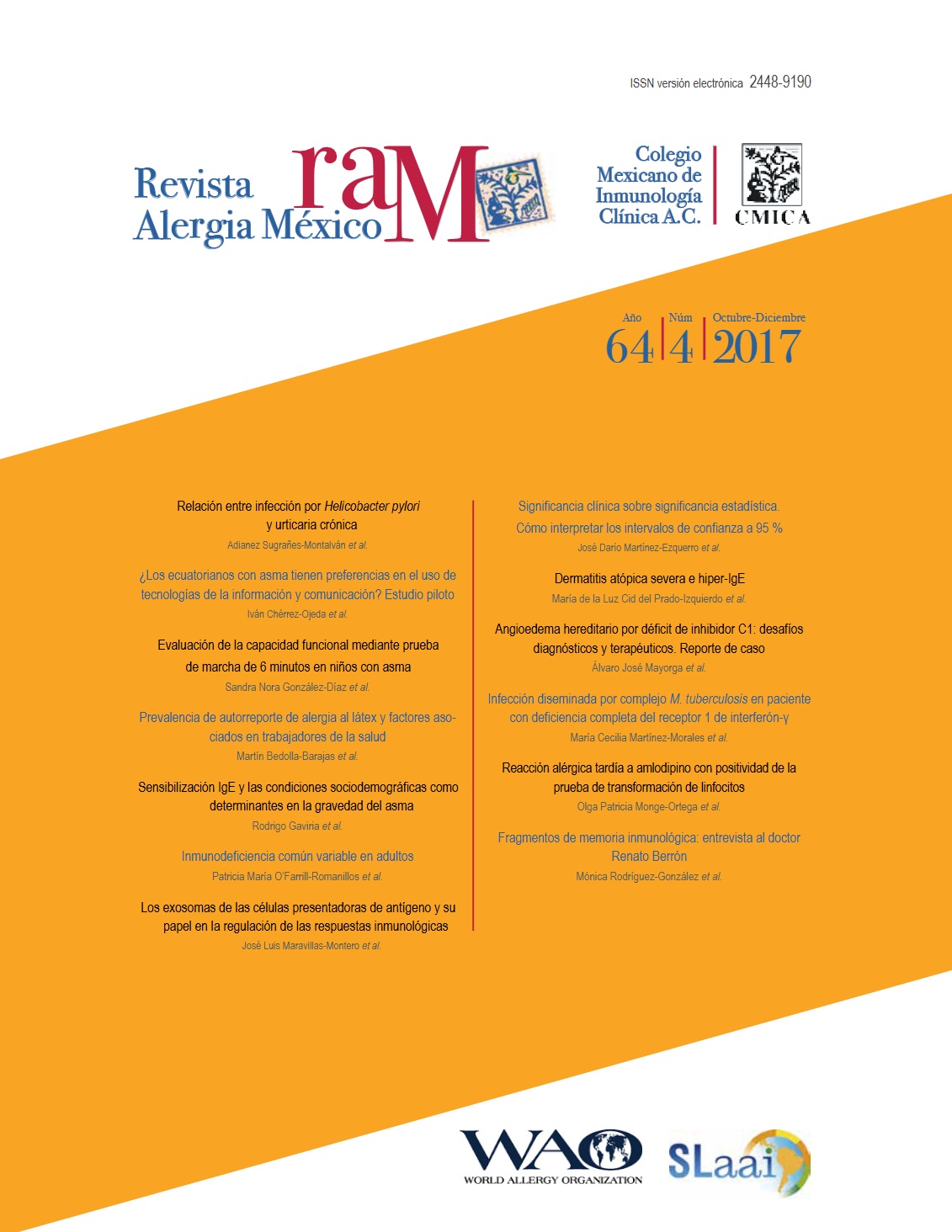Abstract
Background: Asthma patients show lower exercise tolerance.
Objective: Assessment of functional capacity in children with asthma.
Methods: Girls and boys from 6 to 17 years old were included in two groups: asthmatic patients and healthy subjects. PSPQ was applied and vital signs, peak expiratory flow and Modified Borg Dyspnea Scale were measured at the beginning and the end of 6MWD.
Results: Participants included 58 subjects, including 32 asthmatic patients, and 55.2 % male subjects. Mean age: 10.6 years ± 3.1. Asthmatic group: mean distance covered in meters 456.04 ± 54.05, meters covered by gender 456.31 ± 48.73 male and 455.74 ± 61.29 female (p = 0.28). Control group: the mean was 468.28 ± 54.52 meters, meters covered by gender 465.98 ± 58.04 male, 471.44 ± 51.95 female (p = 0.35). The difference between asthmatic group and control group was 12.24 meters in favor of control group (p = 0.378). There was no association between body mass index (BMI) and distance covered (p = 0.53), but a Pearson correlation p = -0.445. In the male gender, CF was positively associated with self-perception in CAF variables: physical condition, physical attractiveness, strength (p = 0.04) and physical self-concept in general (p = 0.02).
Conclusions: There was no significant difference in the distance covered between the two groups. The main impact factor was the body mass index with an inverse relation to the distance. Males had better physical self-perception, which is positively associated with CF.
References
Li AM, Yin J, Yu C, Tsang T, So H, Wong E, et al. The six-minute walk test in healthy children: Reability and validity. Eur Respir J. 2005;25(6):1057-1060. DOI: http://dx.doi.org/10.1183/09031936.05.00134904
ATS Committee on Proficiency Standards for Clinical Pulmonary Function Laboratories. ATS statement: guidelines for the six-minute walk test. Am J Respir Crit Care Med. 2002;166(1):111-117. DOI: http://dx.doi.org/10.1164/ajrccm.166.1.at1102
Eder W, Ege MJ, Von-Mutius E. The asthma epidemic. N Eng J Med. 2006;355(21):2226-2235. DOI: http://dx.doi.org/10.1056/NEJMra054308
Gandhi PK, Kensik KM, Thompson LA, DeWalt DA, Revicki DA, Shenkman EA, et al. Exploring factors influencing asthma control and asthma-specific health-related quality of life among children. Respir Res. 2013;14(1):26. DOI: http://dx.doi.org/10.1186/1465-9921-14-26
Ebbeling CB, Pawlak DB, Ludwig DS. Childhood obesity: public-health crisis, common sense cure. Lancet. 2002;360(9331):473-482. DOI: http://dx.doi.org/10.1016/S0140-6736(02)09678-2
Lobstein T, Baur L, Uauy R, International Obesity TaskForce. Obesity in children and young people: a crisis in public health. Obes Rev. 2004;5(Supp 1):4-85. DOI: http://dx.doi.org/10.1111/j.1467-789X.2004.00133.x
Fanelli A, Cabral AL, Neder JA, Martins MA, Carvalho CR. Exercise training on disease control and quality of life in asthmatic children. Med Sci Sports Exerc. 2007;39(9):1474-1480. DOI: http://dx.doi.org/10.1249/mss.0b013e3180d099ad
Pianosi PT, Davis HS. Determinants of physical fitness in children with asthma. Pediatrics. 2004;113(3 Pt 1):e225-e229.
Kenney L, Wilmore J, Costill D. Physiology of sport and exercise. Quinta edición. EUA: Human Kinetics; 2012.
Luna-Padrón E, Domínguez-Flores F, Rodríguez-Pérez A, Gómez-Hernández J. Estandarización de la prueba de caminata de 6 minutos en sujetos mexicanos sanos. Rev Inst Nal Enf Resp Mex. 2000;13(4):205-210. Disponible en: http://www.medigraphic.com/pdfs/iner/in-2000/in004d.pdf
Lacasse Y, Martin S, Lasserson TJ, Goldstein RS. Meta-analysis of respiratory rehabilitation in chronic obstructive pulmonary disease. A Cochrane Systematic Review. Eura Medicophys. 2007;43(4):475-485.
Marchiori-Battilani V, Junho-Sologuren M, Gastaldi A. Crianças com asma leve caminham menor distância que crianças não asmáticas, no mesmo periodo de tempo. Rev Bras Educ Fis Esp. 2004;18(1):117-124. DOI: http://dx.doi.org/10.1590/S1807-55092004000100009
Pedrolongo-Basso R, Jamami M, Gonçalves-Labadessa I, Gatti-Regueiro E, Pessoa BV, Oliveira AD, et al. Relationship between exercise capacity and quality of life in adolescents with asthma. J Bras Pneumol. 2013;39(2):121-127. DOI: http://dx.doi.org/10.1590/S1806-37132013000200002
Villa F, Castro AP, Pastorino AC, Santarém JM, Martins MA, Jacob CM, et al. Aerobic capacity and skeletal muscle function in children with asthma. Arch Dis Child. 2011;96(6):554-559. DOI: http://dx.doi.org/10.1136/adc.2011.212431
Chandratilleke M, Carson K, Picot J, Brinn M, Esterman AJ, Smith BJ. Physical training for asthma. Cochrane Database Syst Rev. 2013;30(9):CD001116. DOI: http://dx.doi.org/10.1002/14651858.CD001116.pub4
Avallone K, McLeish A. Asthma and aerobic exercise: A review of the empirical literature. J Asthma. 2013;50(2):109-116. DOI: http://dx.doi.org/10.3109/02770903.2012.759963
Solway S, Brooks D, Lacasse Y, Thomas S. A qualitative systematic overview of the measurement properties of functional walk tests used in the cardiorespiratory domain. Chest. 2001;119(1):256-270. DOI: http://dx.doi.org/10.1378/chest.119.1.256
Bartels B, De-Groot J, Terwee CB. The six-minute walk test in chronic pediatric conditions: a systematic review of measurement properties. Phys Ther. 2013;93(4):529-541. DOI: http://dx.doi.org/10.2522/ptj.20120210
Zenteno D, Puppo H, González R, Kogan R. Test de marcha de seis minutos en pediatría. Neumol Pediatr. 2007;2:109-114. Disponible en: http://repositorio.uchile.cl/bitstream/handle/2250/128500/142984_C11_TM6minPediatria.pdf
Pacheco-Ríos N, Espitia-Hernández G, Sánchez-Ortiz A. Caminata de 6 minutos en una población pediátrica de 6 a 12 años de edad derechohabiente del Hospital 1º de Octubre. Neumol Cir Torax. 2013;72(2):147-153.
Goñi-Grandmontagne A, Rodríguez-Fernández A. Trastornos de conducta alimentaria, práctica deportiva y autoconcepto físico en adolescentes. Actas Esp Psiquiatr. 2004;32(1):29-36.
Global Initiative for Asthma. [Sitio web]. Global Strategy for Asthma Management and Prevention 2015. Disponible en http://ginasthma.org/wp-content/uploads/2016/01/GINA_Report_2015_Aug11-1.pdf
Goñi-Grandmontagne A, Ruiz-De-Azúa S, Liberal I. Propiedades psicométricas de un nuevo cuestionario para la medida del autoconcepto físico. Rev Psicol Deporte. 2004;13(2):195-213.
Andrade LB, Silva DA, Salgado TL, Figueroa JN, Lucena-Silva N, Britto MC. Comparison of six-minute walk test in children with moderate/severe asthma with reference values for healthy children. J Pediatr (Rio J). 2014;90(3):250-257. DOI: http://dx.doi.org/10.1016/j.jped.2013.08.006
Sperb-Rubin A, De-Castro-Pereira CA, Neder JA, Fitterman J, Menezes-Pizzichini MM. Hiperresponsividade brônquica. J Pneumol. 2002;28 Supl 3 :S101-S121. Disponible en: http://www.jornaldepneumologia.com.br/PDF/Suple_145_45_44%20Hiperresponsividade%20br%F4nquica.pdf
Cahalin L, Pappagianopoulos P, Prevost S, Wain J, Ginns L. The relationship of the 6-min walk test to maximal oxygen consumption in transplant candidates with end-stage lung disease. Chest. 1995;108(2):452-459. DOI: http://dx.doi.org/10.1378/chest.108.2.452
Pérez-Padilla J, Vázquez-García J. Estimation of gasometric values at different altitudes above sea level in Mexico. Rev Invest Clin. 2000;52(2):148-155.
Ostrom NK, Parsons JP, Eid ns, Craig TJ, Stoloff S, Hayden ML, et al. Exercise-induced bronchospasm, asthma control, and obesity. Allergy Asthma Proc. 2013;34(4):342-348. DOI: http://dx.doi.org/10.2500/aap.2013.34.3674
Clark CJ, Cochrane LM. Assessment of work performance in asthma for determination of cardiorespiratory fitness and training capacity. Thorax. 1988;43(10):745-749. Disponible en: https://pdfs.semanticscholar.org/ebca/7941ab5556fbab3917dd3d2cce667e17932f.pdf

This work is licensed under a Creative Commons Attribution-NonCommercial 4.0 International License.
Copyright (c) 2017 Revista Alergia México

